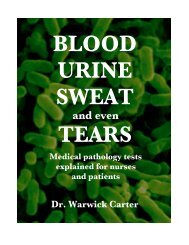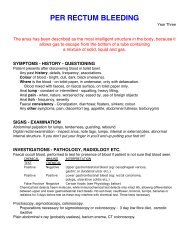MALE GENITOURINARY SYMPTOMS - Medwords.com.au
MALE GENITOURINARY SYMPTOMS - Medwords.com.au
MALE GENITOURINARY SYMPTOMS - Medwords.com.au
You also want an ePaper? Increase the reach of your titles
YUMPU automatically turns print PDFs into web optimized ePapers that Google loves.
<strong>MALE</strong> <strong>GENITOURINARY</strong> <strong>SYMPTOMS</strong><br />
may have been missed by the biopsy needle.<br />
There are many treatment options for prostate cancer :-<br />
- No treatment - in elderly or very ill patients when the patient is more likely to die with the disease than<br />
from the disease. Treatment may have an adverse effect on the man’s life.<br />
- Surgery - radical prostatectomy in which the gland is surgically removed. Complications may include<br />
impotence (75%+) and urinary incontinence (25% over all, but severe in 3%).<br />
- Radiotherapy - an external beam of radiation is targeted on the prostate from many different directions in<br />
order to destroy the cancer. Complications may include irritable bowel and bladder, with the frequent use of<br />
one or both.<br />
- Brachytherapy - tiny radioactive particles are injected into the prostate to create radiation, which destroys<br />
the cancer. This may be <strong>com</strong>bined with radiotherapy. The <strong>com</strong>plications are the same as radiotherapy.<br />
- Medication - Antiandrogens (eg. nilutamide, bicalutamide) are used to slow the progress of more<br />
advanced cases of the disease.<br />
- Orchidectomy (removal of the testes) - this was sometimes performed to remove all testosterone from the<br />
man’s body, as this hormone stimulates growth of the cancer. It is now a rare procedure.<br />
Many new treatment regimes are being introduced every year including new hormones, new cytotoxics and<br />
high intensity focused ultrasound.<br />
If the cancer is localised to the gland itself, the five-year survival rate is over 90%. With local spread, the<br />
survival rate drops to about 70%, but with spread to the bone, only 30% of patients survive five years.<br />
PROSTATITIS<br />
Prostatitis is an infection of the prostate gland, which sits behind the base of the penis, by bacteria that may<br />
enter the prostate by moving up the urethra (urine tube) from the outside, from a sexually transmitted infection (eg.<br />
gonorrhoea), or un<strong>com</strong>monly from an infection spreading from other parts of the body.<br />
Pain occurs behind the base of the penis, and there is a discharge from the penis, pain on passing urine,<br />
fever and patients pass urine frequently. The infection may spread to the man's sexual partner, in whom it can<br />
c<strong>au</strong>se pelvic inflammatory disease.<br />
The diagnosis confirmed by taking a swab from the urethra, and identifying the bacteria present, and<br />
treatment requires taking a long course of antibiotics.<br />
Acute case usually settles with treatment, but recurrences are <strong>com</strong>mon and a low-grade persistent infection<br />
may develop, which is difficult to treat.<br />
REITER SYNDROME<br />
Reiter syndrome (reactive arthritis) is an inflammatory condition involving the eyes, urethra and joints. The<br />
c<strong>au</strong>se is unknown, but it is more <strong>com</strong>monly in young men, and often follows a bacterial infection.<br />
It has the unusual and apparently unconnected symptoms of conjunctivitis (eye inflammation), urethritis<br />
(inflammation of the urine tube - the urethra) and arthritis (joint inflammation). Other symptoms that may occur<br />
include mouth ulcers, skin sores, inflammation of the foreskin of the penis and a fever. Rarely, the heart be<strong>com</strong>es<br />
inflamed.<br />
Blood tests are not diagnostic, but indicate presence of inflammation, and X-rays show arthritis in the joints<br />
of the back only after several attacks.<br />
It heals without treatment after a few days or weeks, but the arthritis tends to last longer and recurrences are<br />
<strong>com</strong>mon. The disease course can be shortened by anti-inflammatory drugs such as indomethacin.<br />
TERATOMA<br />
A teratoma (or dermoid cyst in the USA) is an un<strong>com</strong>mon and unusual form of cancer that occurs in the<br />
ovaries or testes. As the ovaries are the source of eggs, and the testes of sperm, that are used for fertilisation and<br />
growth into new humans, the cells (stem cells) in the ovary and testes, when cancerous may develop into many<br />
different types of tissue.<br />
All types of strange tissue may develop in the tumour, including gland tissue, muscle tissue, skin and even<br />
teeth.<br />
In women, symptoms are often minimal until the cancer is quite large, or bleeding occurs into it to c<strong>au</strong>se an<br />
abdominal lump or pain. Men feel a hard, tender lump in a testicle.<br />
The tumour is diagnosed by x-rays, CT scans and biopsy of the tumour. Surgical removal of the cancer and<br />
surrounding tissue is usually all that is necessary, but rarely, an aggressive cancer may be present, that spreads to<br />
other parts of the body. The overall cure rate is close to 90%.<br />
TESTICULAR CANCER<br />
12









